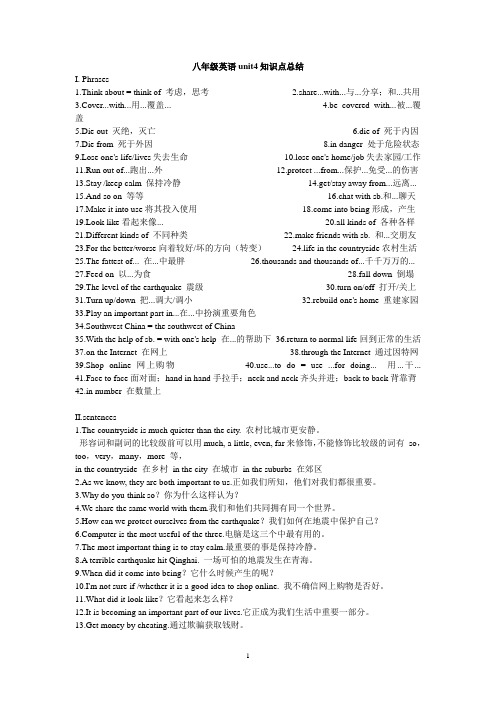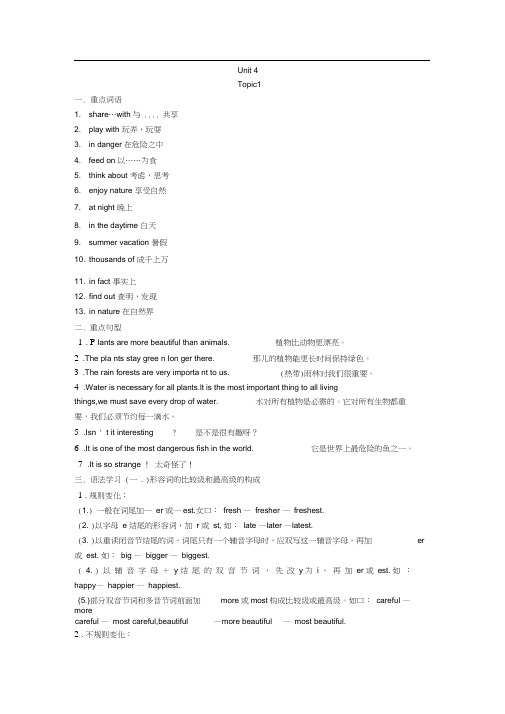仁爱版八年级上册单元知识点复习unit4
仁爱英语八年级上册英语unit4知识点总结

八年级英语unit4知识点总结I. Phrases1.Think about = think of 考虑,思考2.share...with...与...分享;和...共用3.Cover...with...用...覆盖...4.be covered with...被...覆盖5.Die out 灭绝,灭亡6.die of 死于内因7.Die from 死于外因8.in danger 处于危险状态9.Lose one's life/lives失去生命10.lose one's home/job失去家园/工作11.Run out of...跑出...外12.protect ...from...保护...免受...的伤害13.Stay /keep calm 保持冷静14.get/stay away from...远离...15.And so on 等等16.chat with sb.和...聊天17.Make it into use将其投入使用e into being形成,产生19.Look like看起来像... 20.all kinds of 各种各样21.Different kinds of 不同种类22.make friends with sb. 和...交朋友23.For the better/worse向着较好/坏的方向(转变)24.life in the countryside农村生活25.The fattest of... 在...中最胖26.thousands and thousands of...千千万万的...27.Feed on 以...为食28.fall down 倒塌29.The level of the earthquake 震级30.turn on/off 打开/关上31.Turn up/down 把...调大/调小32.rebuild one's home 重建家园33.Play an important part in...在...中扮演重要角色34.Southwest China = the southwest of China35.With the help of sb. = with one's help 在...的帮助下36.return to normal life回到正常的生活37.on the Internet 在网上38.through the Internet 通过因特网39.Shop online 网上购物e...to do = use ...for doing... 用...干...41.Face to face面对面;hand in hand手拉手;neck and neck齐头并进;back to back背靠背42.in number 在数量上II.sentences1.The countryside is much quieter than the city. 农村比城市更安静。
八年级上册英语仁爱版unit4知识点

八年级上册英语仁爱版unit4知识点Unit4主要涉及的教学内容包括名词所有格、不定代词、情态动词“must”、“might”和“could”等。
下面会依次详细介绍这些知识点。
1. 名词所有格名词所有格即表示某个名词所拥有的东西。
在英语中,通常在名词后面加上“’s”来表示所有格。
如果名词是以“s”结尾,则只需加上一个“’”,如下所示:- My sister’s book (我妹妹的书)- The students’ uniforms (学生们的制服)- James’ car (詹姆士的车)当名词是某个国家或城市等团体名词时,表示所有格时需要在该名词后面加上“of”,如下所示:- The capital of China (中国的首都)- The history of America (美国的历史)2. 不定代词不定代词通常在句子中作主语、宾语或表语等。
它们没有具体指代的对象,如下所示:- Something (某些东西)- Anything (任何事情)- Nothing (没有任何东西)除此之外,不定代词还包括everybody、someone、anyone、nobody等,在句子中作主语或宾语,如下所示:- Everybody loves ice cream (每个人都喜欢吃冰激凌)- Someone is knocking at the door (有人在敲门)- Anyone can join the club (任何人都可以加入这个俱乐部)- Nobody knows the answer (没有人知道答案)3. 情态动词“must”、“might”和“could”情态动词可以表示说话人对某些事情的看法、推测与义务等。
在Unit4中主要介绍了“must”、“might”和“could”。
- must“must”表示有义务或必须做某事,也可表示根据某些信息得出的推断。
- You must turn off the lights when you leave the classroom. (离开教室时必须关灯)- He must be very tired. (他一定很累了)- might / could“might”和“could”都表示推测或猜测某件事情的可能性,但“might”表示可能性比“could”稍微弱一点。
仁爱八年级上unit4知识点总结.

Unit 4 Topic1一. 重点词语1. share …with 与 .... 共享2. play with 玩弄,玩耍3. in danger 在危险之中4. feed on 以……为食5. think about 考虑,思考6. enjoy nature 享受自然7. at night 晚上8. in the daytime 白天9. summer vacation 暑假 10. thousands of 成千上万 11. in fact 事实上 12. find out 查明,发现 13. in nature 在自然界 二. 重点句型1 . P Iants are more beautiful than animals.2 .The pla nts stay gree n Ion ger there.3 .The rain forests are very importa nt to us.4 .Water is necessary for all plants.lt is the most important thing to all livingthings,we must save every drop of water. 水对所有植物是必需的。
它对所有生物都重要,我们必须节约每一滴水。
5 .Isn ' t it interesting? 是不是很有趣呀?6 .It is one of the most dangerous fish in the world. 它是世界上最危险的鱼之一。
7 .It is so strange ! 太奇怪了!三. 语法学习 (一 . )形容词的比较级和最高级的构成1 . 规则变化:(1.) 一般在词尾加一 er 或一est.女口: fresh — fresher — freshest. (2. )以字母 e 结尾的形容词,加 r 或 st, 如: late —later —latest.(3. )以重读闭音节结尾的词,词尾只有一个辅音字母时,应双写这一辅音字母,再加 er或 est. 如: big — bigger — biggest.( 4. ) 以 辅 音 字 母 + y 结 尾 的 双 音 节 词 , 先 改 y 为 i , 再 加 er 或 est. 如 : happy — happier — happiest. (5.)部分双音节词和多音节词前面加 more 或most 构成比较级或最高级。
仁爱英语八年级上册unit 4的知识点

仁爱英语八年级上册unit 4的知识点Unit 4是仁爱英语八年级上册的一个重要单元,本单元的主题是“地球村”,主要内容包括国际会议、计划和国际组织等。
在学习本单元之前,建议学生们先了解一些有关国家、地图和文化的基础知识。
在这篇文章中,我们将介绍本单元的主要知识点及其重点内容。
一、重点词汇1. conference: 会议2. organization: 组织3. charity: 慈善机构4. global: 全球的5. pollution: 污染6. poverty: 贫穷7. famine: 饥荒8. treaty: 条约9. alliance: 联盟10. epidemic: 流行病二、重点句型1. We must take action to solve environmental problems.2. The United Nations is an international organization promoting cooperation among nations.3. A treaty is an agreement between two or more countries.4. The World Health Organization is a specialized agency of the United Nations that is concerned with international public health.5. The Red Cross is an international humanitarian organization providing assistance during conflicts and disasters.三、重点内容1. 国际会议本单元将介绍几种国际组织和会议,主要包括联合国、世界贸易组织、世界卫生组织和气候变化公约。
Unit 4 知识点 仁爱版英语八年级上册

2021-2022学年仁爱英语八年级上册unit4知识点(详细版)八年级上册unit4 topic1语法形容词和副词的比较一,比较级: A be/v +比较级+than B “A比B更。
”二,最高级:主语+be/v +(the) +最高级+比较范围(比较范围:of the 复数/ in+地点)三,比较级,最高级的变化规则✓一般直接在词尾加er/est✓以不发音e结尾的,直接加r/st✓以一个元音字母加一个辅音字母结尾的重读闭音节,双写结尾的辅音字母再加er/est✓以辅音字母加y结尾的,把y变i 再加er/est✓部分双音节词和全部多音节词要在词前加more/most不规则变化✓g ood/well-better -best好✓b ad /ill -worse -worst 坏✓m any /much -more -most许多✓l ittle -less -least 少✓f ar -farther-farthest距离远✓f ar -further -furthest 程度深四,比较级前可以加much/even/still/a little 等表强调五,比较级表达最高级比较级+than any other +名词单数“比其他任何。
都更”比较级+than the other +名词复数“比其他。
都更。
”Mike gets to school earlier than any other student in his class.迈克比他们班上任何一个其他的同学到校都早。
= Mike gets to school earlier than the other students in his class.迈克比他们班上其他的同学到校都早。
= Mike gets to school earliest in his class.迈克在他们班到校最早。
The Yangtze River is longer than any other river in China. 长江比中国的任何一条其他的河都长。
仁爱英语八年级(上册)Unit4总复习

Which do you like better, plants or animals?
like … better 更喜欢…… I like apples better. I like cats best. like … best 最喜欢…… I like bananas best.
3. A: Do you like the countryside? B: Yes, / I like it very much / because / the air is fresher, the sky is bluer/ and the rivers are clearer there.
I think the sheep are the __ni_c_e_st__ of all. The pigs must be the _f_a_tt_e_s_t_ and _la_z_ie_s_t__ animals on the farm.
What’s the strongest animals on the farm ?
Topic 1 What’s the strongest animal on the farm?
What can we see in the countryside?
sheep some sheep
What can we see in the countryside?
goose
some geese
be important to sb.
We share the same world with them.
share … with … 与……分享…… Eg: They are sharing a piece of long bread.
They often share beautiful music with each other.
仁爱版八年级英语上册 Unit 4 Topic 3重点知识点总结
仁爱版八年级英语上册Unit 4 Topic 3重点知识点总结一,词组:1,shop online=shop on the Internet网上购物2,face to face面对面3,on the website在网络上4,do some shopping购物5,and so on等等6,chat with与某人聊天7,find out找出,查明8,come into being形成,产生9,in the 1960s在20 世纪60年代10,make ...into use把...投入使用11,more and more important12,make sb do sth使某人做某事13,make sb +职业:选取某人做谋职业14,let sb (not) do sth让某人(不)做某事15,ask sb (not)to do sth要求某人(不)做某事16,see sb doing看到某人正在做某事17,learn to cook学习烹饪18,photos of Mars火星照片19,put...into把...放进20,be sure确信21,search for寻找22,look up查阅23,lose oneself in沉迷于.....24,a part of...的一部分25,all kinds of不同种类的26,share...with...与...分享...27,make friends with与...交朋友28, spend...doing sth花时间做某事29,correct grammar纠正语法30,change...into...把...转变成...二,重点句子:1,I am doing some shopping on the Internet.我在网上购物。
2,What else can you do?你还会做其他什么?3,I can also chat with my grandmother face to face.我也可以面对面和我的奶奶聊天。
仁爱版八年级上册unit4知识点
仁爱版八年级上册unit4知识点八年级上册unit4主要讲述了有关“时尚”的话题。
本文将从以下三个方面介绍本单元的主要知识点:单词及词组、语法知识以及文化常识。
一、单词及词组1. fashion(时尚):指一种流行的风尚、态度、风格或行为。
2. trend(趋势):指在一定时期内主导或普遍流行的模式或偏好。
3. outfit(装备或衣着):指一整套衣服或饰品。
4. accessory(饰品):指用来补齐或美化装扮的小饰物。
5. match(搭配):指合理地组合或配对衣服、饰品等物品。
6. coordinate(协调):指让不同的衣服、鞋子、包等互相搭配起来,一起构成一种完美的形象。
7. style(风格):指时尚的流行风格或个人风格。
8. brand(品牌):指出产某种产品的公司或商标。
二、语法知识1. 情态动词:可以表达说话人的态度、意见、建议、请求、批评、情感等。
例如:should、would、could等。
2. 动词时态:主要有简单现在时、一般过去时、现在进行时、过去进行时、一般将来时、被动语态等多种形式。
在描述过去发生的事情时,通常使用一般过去时;在描述正在进行的动作时,使用现在进行时等。
3. 名词性从句:是指在主句中用名词性词语(如what, who, whom, which, whose等)引导的一个完整的句子,它在句中担任名词的作用。
例如:“I don't know what style is popular this year.”(我不知道今年什么风格流行。
)4. 形容词和副词的比较级和最高级:在表达比较时,需要使用形容词和副词的比较级和最高级形式。
例如:trendy(时髦)-trendier(更时髦)-trendiest(最时髦)。
三、文化常识1. 不同地区的时尚风格:不同地区的人们有着不同的时尚风格,例如巴黎、米兰、伦敦的时尚风格各有千秋。
2. 时尚品牌的认知:时尚品牌的认知很重要,它可以代表着消费者对自身品味和身份的诉求。
仁爱版八年级上册英语 Unit 4 Our World 单元知识点总结
仁爱版八年级上册英语 Unit 4 Our World 单元知识点总结Topic 1 Which do you like better, plants or animals?【重点短语】1. share…with 与……共享......2. play with 玩弄,玩耍3. in danger 在危险之中4. feed on 以……为食5. think about 考虑,思考6. enjoy nature 享受自然7. at night 在晚上8. in the daytime 白天9. summer vacation 暑假10. thousands of 成千上万11. in fact 事实上12. find out 查明,发现13. in nature 在自然界【重点句型】1. Plants are more beautiful than animals. 植物比动物更漂亮。
2. The plants stay green longer there. 那儿的植物能更长时间保持绿色。
3. The rainforests are very important to us. 雨林对我们很重要。
4. Water is necessary for all plants. It is the most important thing to all living things, we must save every drop of water. 水对所有植物是必需的。
它对所有生物都重要,我们必须节约每一滴水。
5. Isn’t it interesting? 是不是很有趣呀?6. It is one of the most dangerous fish in the world. 它是世界上最危险的鱼之一。
7. It is so strange! 太奇怪了!【重点语法】一. 形容词的比较级和最高级的构成1. 规则变化:(1)一般在词尾加—er或—est,如:fresh—fresher—freshest(2)以字母e结尾的形容词,加r或st,如:late—later—latest(3)以重读闭音节结尾的词,词尾只有一个辅音字母时,应双写这一辅音字母,再加er或est,如:big—bigger—biggest(4)以辅音字母+y结尾的双音节词,先改y为i,再加er 或est,如:happy—happier—happiest(5)部分双音节词和多音节词前面加more或most构成比较级或最高级。
仁爱版八年级上册英语第四单元笔记
第一部分:单元主题介绍1. 本单元主题:Living well2. 生活质量的重要性3. 家庭、朋友和身心健康的关系4. 健康的生活方式5. 身心健康的重要性第二部分:词汇与语法1. 本单元重点词汇介绍- healthy lifestyle:健康的生活方式 - nutrition:营养- balanced diet:均衡饮食- physical activity:身体活动- mental well-being:心理健康2. 语法知识- 情态动词can和should的用法- 被动语态的构成- 定语从句的使用第三部分:听力与口语训练1. 听力练习- 听取健康生活方式的建议- 听取他人的健康问题并提出建议2. 口语训练- 和同学一起讨论健康饮食和运动计划 - 向他人提出关于改善生活方式的建议第四部分:阅读与写作练习1. 阅读练习- 阅读健康饮食和运动的文章- 阅读有关精神健康的文章2. 写作练习- 撰写一篇关于健康饮食的文章- 撰写一篇有关身心健康的文章第五部分:文化与实践1. 健康生活方式在我国的文化基础- 我国人的饮食文化- 传统的养生方式- 当代我国人的生活方式变化2. 实际操作- 设计健康餐单- 制定身体活动计划- 草拟一个关于身心健康的口号总结部分1. 本单元学习目标:了解并谈论健康生活方式的重要性,学习使用有关健康的词汇和语法知识,提高听力口语能力,培养健康的生活习惯。
2. 落实方式:听力、口语练习、阅读和写作训练以及实际操作3. 评价方式:课堂表现、作业完成情况、口头表达能力和实际操作成果4. 下一步学习目标:巩固健康生活方式的词汇和语法知识,提高口语表达能力,进一步实践健康生活方式。
第六部分:课堂实践与探究1. 互动教学- 学生分组讨论健康生活方式的好处和挑战- 鼓励学生共享个人的健康习惯和经验- 学生展示并讨论他们设计的健康餐单和身体活动计划2. 探究活动- 学生小组展开小研究,调查同学们的健康习惯和看法- 分析调查结果,比较不同芳龄段和性莂在健康生活方式上的差异- 总结调查结果,提出改善健康生活方式的建议第七部分:作业与评价1. 作业安排- 完成阅读练习并做相关的练习题- 撰写关于健康饮食和运动计划的小作文- 设计一个宣传海报,宣传健康生活方式的重要性- 进行身体活动,记录并反思自己的运动习惯2. 评价方法- 课堂表现和参与度- 书面作业完成情况- 口头表达能力和互动讨论的贡献- 对健康生活方式的实际行动和改变第八部分:家校合作1. 家长交流会- 邀请家长参加学校举办的健康生活方式讲座- 鼓励家长和学生共同制定健康生活方式的目标和计划- 促进家长参与学校的健康生活方式教育2. 家庭作业- 鼓励学生和家长共同制定并实施家庭健康计划- 家庭成员共同参与食品采购和烹饪,注重均衡饮食- 家庭一起进行户外活动,促进亲子关系和健康生活方式的实践第九部分:华文联结1. 本单元相关的华文学习- 学习华文课上与健康生活方式相关的词汇与写作- 阅读华文文章,了解我国传统的健康理念和养生方式- 通过华文学习,拓宽对健康生活方式的跨文化认识总结部分在本单元的学习中,学生通过词汇、语法、听力、口语、阅读、写作、实践等多种方式全面提高了“Living well”主题下的各项能力。
- 1、下载文档前请自行甄别文档内容的完整性,平台不提供额外的编辑、内容补充、找答案等附加服务。
- 2、"仅部分预览"的文档,不可在线预览部分如存在完整性等问题,可反馈申请退款(可完整预览的文档不适用该条件!)。
- 3、如文档侵犯您的权益,请联系客服反馈,我们会尽快为您处理(人工客服工作时间:9:00-18:30)。
Unit 4 Our WorldTopic1 we share the world with plants and animals一.重点词语1. share…with 与……共享2. play with 玩弄,玩耍3. in danger 在危险之中4. feed on 以……为食5. think about 考虑,思考6. enjoy nature 享受自然7. at night 晚上8. in the daytime 白天9. summer vacation 暑假10. thousands of 成千上万11. in fact 事实上12. find out 查明,发现13. in nature 在自然界二.重点句型1.Plants are more beautiful than animals.植物比动物更漂亮。
2.The plants stay green longer there.那儿的植物能更长时间保持绿色。
3.The rainforests are very important to us.(热带)雨林对我们很重要。
4.Water is necessary for all plants.It is the most important thing to all living things,we must save every drop of water.水对所有植物是必需的。
它对所有生物都重要,我们必须节约每一滴水。
5.Isn’t it interesting?是不是很有趣呀?6.It is one of the most dangerous fish in the world.它是世界上最危险的鱼之一。
7.It is so strange!太奇怪了!三.语法学习(一.)形容词的比较级和最高级的构成1. 规则变化:(1.)一般在词尾加—er或—est.如:fresh—fresher—freshest.(2.)以字母e结尾的形容词,加r或st,如:late—later—latest.(3.)以重读闭音节结尾的词,词尾只有一个辅音字母时,应双写这一辅音字母,再加er 或est.如:big—bigger—biggest.(4.)以辅音字母+y结尾的双音节词,先改y为i,再加er 或est.happy—happier—happiest. (5.)部分双音节词和多音节词前面加more或most构成比较级或最高级。
如:careful—more careful—most careful,beautiful—more beautiful—most beautiful.2.不规则变化:good/well—better—best,little—less—least,many/much—more—most,bad/ill—worse—worst,fa r—farther/further—farthest/furthest.(二.)形容词的比较级和最高级的用法1. 比较级A<B或A>B,经常与than搭配,或给出比较的二个内容。
可用much和a little 修饰.2. 三者或三者以上比较用最高级,一般给出比较范围.如:of(in)+…。
(1)例句:①I’m happier than you.我比你更快乐。
②Plants are much more beautiful than animals.植物比动物漂亮的多。
(2)例句:①The boy is the tallest in my class.这个男孩是我们班最高的。
②Lesson Two is the most important of all.第二课是所有中最重要的。
一、写出以下各形容词的比较级和最高级:1. nice ______________________2. fat ____________________3. slow_____________________4. dry ____________________5. happy ____________________6. wet____________________7. much ____________________ 8. ill _____________________9. little_____________________10. bad ___________________11. thin ______________________ 12. far____________________13. early _____________________ 14. careful_________________15. exciting ___________________16. busy __________________二、根据句意,用所括号内所级形容词的比较等级形式填空:1. Bob is _________ ( young ) than Fred but ___________ (tall) than Fred.2. Yingtian is not as ___________ (tall) as Yongxian.3. Almost all the students' faces are the same but Li Deming looks _______(fat) than before .4.Which is _________ (heavy), a hen or a chicken?5.-- How _________ (tall) is Sally?-- She' s 1.55 metres ________ (tall). What about Xiaoling?-- She' s only 1.40 metres ________(tall). She is much _______(short) than Sally.She is also the _______ (short) girl in the class.35. Skating is ____ ___ than swimming. (exciting)36. Jim is ____ ___ than all the others. (honest)37. Things are getting _______ and _______. (bad)38. The higher you climb, the _______ it will be. (cold)39. Now his life is becoming ________ and _____ __. (difficult)40. There are _______ boys than girls in our class. (few)答案:一、1. nicer / nicest2. fatter / fattest3. slower / slowest4. drier / driest5. happier / happiest6. wetter / wettest7. more / most8. worse / worst9. less / least10. worse / worst11. thinner / thinnest12. farther / farthest 或further / furthest13. earlier / earliest14. more careful / most careful15. more exciting / most exciting16. busier / busiest二、1. younger, taller2. tall3. fatter4. heavier5. tall, tall, tall, shorter, shortest6. bad, worse, worst7. kindest8. friendlier9. more expensive10. bigger, smaller11. longest12. more beautiful13. big14. more difficult15. well, better, best16. busiest17. fatter, fatter18. cheaper19. earlier20. interesting21. wider, brighter22. much23. more, better24. more important25. more dangerous, most dangerous26 richest27. coldest28cheap29hotter30 more careful31 More32 easier33smaller34 farter [further]35more exciting36 more honest37 worse, worse38 colder39 more, more difficult40 fewer四.交际用语:学习如何用英语描述和谈论我们生存的自然环境Do you like plants or animals?What are you thinking about?Why do you think so?What kind of wild animal is the most dangerous,the tiger,the snake or the bear?Why must we save every drop of water?Ⅰ. 单项选择。
(10分)( )1.All animals need _______ water.A.littleB.manyC.lot ofD.plenty of( )2.—You are standing too near to the TV. Can you move a bit _______?—OK, Mom. Is it all right here?A.fasterB.slowerC.fartherD.nearer( )3.—Did you have breakfast this morning?—No, I got up late and went to school _______ breakfast.A.forB.inC.withoutD.after( )4.Your classroom is so dirty. Everyone should keep it _______.A.dryB.openC.quietD.clean( )5.There were _______ animals in the forest many years ago.A.thousand ofB.thousands ofC.three thousand ofD.three thousands of( )6.—Wow, your school is great!—It is _______ school in the city.A.much more beautifulB.much beautifulC.the most beautifulD.beautiful( )7.Blue whales are the largest and heaviest animals in the world, but they _______ the smallest sea animals.A.feed inB.live inC.feed onD.fed on( )8.—Zhou Fang, can you finish your homework better with _______ time?—I think I can.A.fewB.fewerC.littleD.less( )9.As we know, water is very important _______ us.A.ofB.toC.onD.with( )10.Look! There is a rabbit, two _______ and two _______ in the picture.A.cows; sheepsB.mice; tigerC.gooses; snakesD.foxes; wolvesⅠ. 词汇。
